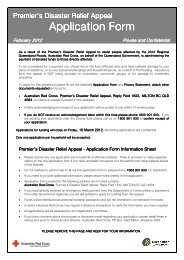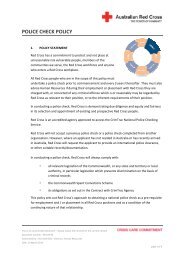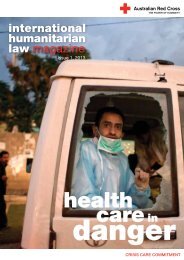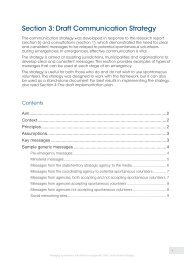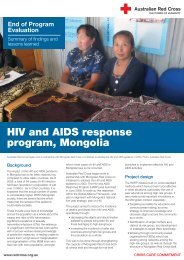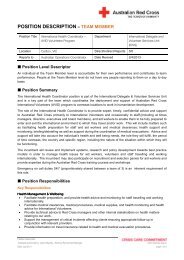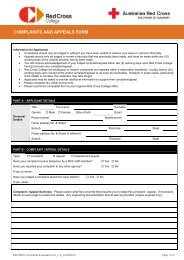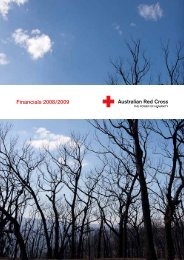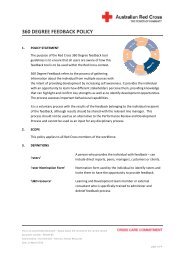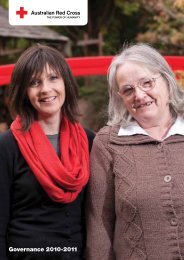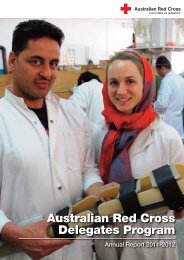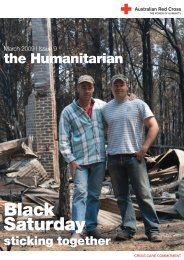Issue 10, August 2009 - Australian Red Cross
Issue 10, August 2009 - Australian Red Cross
Issue 10, August 2009 - Australian Red Cross
You also want an ePaper? Increase the reach of your titles
YUMPU automatically turns print PDFs into web optimized ePapers that Google loves.
<strong>August</strong> <strong>2009</strong> | <strong>Issue</strong> <strong>10</strong><br />
the Humanitarian<br />
crossing<br />
the line<br />
a journey<br />
of hope
P2 the Humanitarian<br />
the inside<br />
editorial<br />
In this edition of the Humanitarian, our cover story ‘<strong>Cross</strong>ing the line’ by Sydney<br />
Morning Herald journalist Andrew Stevenson explores the role of the Geneva<br />
Conventions in their 60th anniversary year. A year in which the <strong>Red</strong> <strong>Cross</strong><br />
Movement also celebrates 90 years as a Federation of <strong>Red</strong> <strong>Cross</strong> and <strong>Red</strong><br />
Crescent Societies in 186 countries, and one in which we recognise the vision of<br />
our founder Henri Dunant 150 years after he witnessed the Battle of Solferino.<br />
It is also, the Year of the Blood Donor and the 80th anniversary of the <strong>Red</strong><br />
<strong>Cross</strong> Blood Service, which prompts Liz Thynne to reflect on one of life’s<br />
most precious gifts. As a nurse who joined us in the mid 1960’s, when the<br />
population was booming and new uses for blood and its derivatives were<br />
being discovered all over the world, Liz celebrates the leading role <strong>Red</strong> <strong>Cross</strong><br />
Blood Service has played in Australia.<br />
It has of course also been a significant time for <strong>Red</strong> <strong>Cross</strong> in Australia during<br />
one of the most devastating natural disasters we have faced. In this edition<br />
the survivors of the Victorian bushfires tell Jacqui Pringle how they are moving<br />
towards recovery in a touching piece titled ‘A new kind of normal’.<br />
We are also moved by Flora Fekira, a 23 year old refugee from Sudan who is<br />
using dance to help other refugees deal with the trauma of conflict and the<br />
difficulties of adapting to a radically different new life. Eight years after her<br />
arrival Flora is now working with <strong>Red</strong> <strong>Cross</strong> to support other migrants<br />
and refugees.<br />
Please enjoy this edition of the Humanitarian. And as you do, please consider<br />
joining radio and television personalities Merrick and Rosso (opposite<br />
page) who are featured in our television campaign. For as little as $15 a<br />
month, you too can make a real difference to people in need by becoming a<br />
Humanitarian Partner. Call 1800 812 018 or join online at<br />
www.redcross.org.au<br />
<strong>10</strong><br />
A journey<br />
of hope<br />
6<br />
<strong>Cross</strong>ing<br />
the line<br />
16<br />
A moving tale<br />
of two islands<br />
22<br />
East Timor<br />
Robert Tickner<br />
CEO <strong>Australian</strong><br />
<strong>Red</strong> <strong>Cross</strong><br />
Michael Raper<br />
Director of Services and<br />
International Operations<br />
<strong>Australian</strong> <strong>Red</strong> <strong>Cross</strong><br />
Make a donation<br />
1800 811 700<br />
First Aid enquiries<br />
1300 367 428<br />
Give blood<br />
13 14 95<br />
Front cover: Civilians walk past a destroyed building<br />
in Gaza City, January <strong>2009</strong>. Photo: MAHMUD<br />
HAMS/AFP/Getty Images
<strong>August</strong> <strong>2009</strong> P3
P4 the Humanitarian<br />
news in brief<br />
<strong>Red</strong> <strong>Cross</strong> volunteers are continuing to provide personal support to those people affected by the Victorian bushfires.<br />
Photo: <strong>Australian</strong> <strong>Red</strong> <strong>Cross</strong>/Rodney Dekker<br />
Bushfire recovery continues<br />
Six months after bushfires devastated parts of Victoria, a new report outlines how<br />
funds raised by the Victorian Bushfire Appeal have been allocated and distributed.<br />
The Victorian Bushfire Appeal has raised more than $375 million, which was<br />
transferred to a trust account established by the Victorian Government.<br />
With $3 million in interest and other funding paid direct to the trust account, a total of<br />
$382 million is available for distribution through the Victorian Department of Human<br />
Services, under the oversight of an independent Advisory Panel.<br />
Meanwhile, the tireless work of hundreds of <strong>Red</strong> <strong>Cross</strong> volunteers in the aftermath<br />
of the bushfires has been recognised by Victorian Premier John Brumby. More than<br />
200,000 meals were provided to emergency services personnel and people in relief<br />
centres, while 220 first aid officers treated over 5,000 patients for conditions<br />
including burns, fractures and respiratory problems. Volunteers also registered<br />
22,000 people at relief centres to let their loved ones know they were safe.<br />
As part of a targeted outreach program, volunteers are continuing to provide personal<br />
support to people affected by the fires as they rebuild their homes and properties.<br />
The program includes home visits, providing information about available services,<br />
and attending community meetings. Community service hubs are still operating in<br />
a number of locations, where people can access all bushfire-related services in<br />
one place. <strong>Red</strong> <strong>Cross</strong> has also established the Victorian Bushfire Recovery Unit,<br />
which is developing resources to assist people and communities affected by the<br />
bushfires. For more information about the community service hubs please<br />
visit www.dhs.vic.gov.au<br />
Dunant’s inspiration is celebrated 150 years on<br />
This year marks the 150th anniversary of Henry Dunant’s inspiration – sparked by the<br />
Battle of Solferino – to create a neutral organisation to care for wounded soldiers. It’s<br />
also the 90th anniversary of the founding of the International Federation of <strong>Red</strong> <strong>Cross</strong><br />
and <strong>Red</strong> Crescent Societies, and the 60th anniversary of the Geneva Conventions.<br />
To commemorate these anniversaries, a series of events were held in Italy in June,<br />
including a torch-lit procession along the path followed by nurses and injured soldiers<br />
after the Battle of Solferino in 1859. Thousands of <strong>Red</strong> <strong>Cross</strong> and <strong>Red</strong> Crescent<br />
volunteers joined in the <strong>10</strong>km walk, including four <strong>Australian</strong>s among 600 youth<br />
ambassadors from around the world.<br />
Women and war exhibition<br />
An exhibition of stark images portraying<br />
the plight of women in countries<br />
affected by war has finished its two-year<br />
run throughout Australia.<br />
Compiled by the International<br />
Committee of the <strong>Red</strong> <strong>Cross</strong> and hosted<br />
by <strong>Australian</strong> <strong>Red</strong> <strong>Cross</strong> in each state, the<br />
collection of 34 images was designed<br />
to remind the public of the protections<br />
that women are afforded in times of<br />
war under International Humanitarian<br />
Law. The exhibition included a series<br />
of photographs exploring themes of<br />
displacement, physical and sexual<br />
violence, loss of contact with loved ones,<br />
detention and lack of access to food and<br />
medical care.<br />
Governor-General and President of<br />
<strong>Australian</strong> <strong>Red</strong> <strong>Cross</strong>, Ms Quentin<br />
Bryce, said the exhibition emphasized<br />
the strength of women in times of war.<br />
‘[The images] show us women and girls<br />
who are vulnerable and threatened,<br />
displaced, dispossessed, detained. Yet<br />
they also speak of women’s tenacity and<br />
courage; the way they hold their families<br />
and communities together; the way they<br />
emerge from trauma and set out on their<br />
road again.’<br />
The exhibition proved successful<br />
with thousands of <strong>Australian</strong>s taking<br />
the opportunity to view the images<br />
and learn more about the diverse<br />
experiences of women throughout<br />
the world.<br />
Mrs Jan de Kretser, President of <strong>Australian</strong> <strong>Red</strong> <strong>Cross</strong><br />
Victoria, and Her Excellency Ms Quentin Bryce AC,<br />
Australia’s Governor-General and President of <strong>Australian</strong><br />
<strong>Red</strong> <strong>Cross</strong>, at the Women and War exhibition.<br />
Photo: Shannon <strong>Red</strong>daway
<strong>August</strong> <strong>2009</strong> P5<br />
news in brief<br />
Pakistan’s displaced return<br />
home to uncertain future<br />
Most displaced people have returned<br />
to their homes in Pakistan after recent<br />
conflict, but safety and access to basic<br />
services remain problematic for many.<br />
The international <strong>Red</strong> <strong>Cross</strong> continues<br />
to assist people affected by fighting,<br />
including those who remain displaced.<br />
It is seeking greater access to Swat,<br />
Buner and Dir.<br />
‘Despite substantial progress in some<br />
districts over the past few weeks, there<br />
remain areas where the population may<br />
not be safe and may not be able to obtain<br />
food, clean water and medical services,’<br />
says Benno Kocher, head of the <strong>Red</strong><br />
<strong>Cross</strong> sub-delegation in Peshawar.<br />
<strong>Red</strong> <strong>Cross</strong> is seeking greater access<br />
to areas affected by fighting to distribute<br />
emergency food rations and evacuate<br />
the wounded.<br />
People on war<br />
As <strong>Australian</strong>s who are working or<br />
caught up in conflicts around the<br />
world well know, the laws of war<br />
are as relevant as ever. Recently,<br />
to gain a better understanding<br />
of our country’s attitudes to<br />
war, <strong>Australian</strong> <strong>Red</strong> <strong>Cross</strong><br />
commissioned the People on<br />
War survey.<br />
While there are some disturbing<br />
results – like respondents’ view on<br />
torture in some circumstances –<br />
in much of the research we found<br />
reasons to be proud of the<br />
community’s awareness on<br />
this subject.<br />
Almost 90% of 1,030 <strong>Australian</strong>s<br />
surveyed have heard of the<br />
Geneva Conventions, while over<br />
90% believe there are laws which<br />
should not be broken without<br />
punishment – even in war. And<br />
90% know that the red cross<br />
emblem is a symbol of protection.<br />
<strong>Red</strong> <strong>Cross</strong> works throughout the<br />
world and in Australia to ensure<br />
An <strong>Australian</strong> rifleman in East Timor. Photo: Courtesy Department<br />
of Defence © Commonwealth of Australia <strong>2009</strong><br />
respect for the Geneva Conventions – laws which have been adopted by<br />
every country.<br />
The Geneva Conventions turned 60 on 12 <strong>August</strong> – an important milestone for<br />
the treaties, which place limits on how war is waged and form the cornerstone of<br />
international humanitarian law (IHL).<br />
‘The laws of war focus on the fundamental concept of a base level of humanity that<br />
applies even during war,’ says Dr Helen Durham, <strong>Red</strong> <strong>Cross</strong>’ Strategic Adviser on<br />
International Law.<br />
A young woman in a camp for displaced people in Pakistan.<br />
Photo: Reuters/Ali Imam courtesy www.alertnet.org<br />
CPR skills hit the net<br />
In an <strong>Australian</strong> first, <strong>Red</strong> <strong>Cross</strong> has launched an online CPR course to teach<br />
people how to maintain someone’s breathing and circulation following a cardiac<br />
arrest. The theory is completed online, before a practical assessment takes place at<br />
a <strong>Red</strong> <strong>Cross</strong> centre.<br />
It only costs $55 to become a certified CPR practitioner. To register for the course,<br />
visit www.redcross.org.au/firstaid (follow the links to Online CPR Training) or<br />
call 1300 367 428.
P6 the Humanitarian<br />
As the Geneva<br />
Conventions turn<br />
60 this year, Andrew<br />
Stevenson asks:<br />
do they make a<br />
material difference<br />
for civilians in times<br />
of war?<br />
crossing the line
<strong>August</strong> <strong>2009</strong> P7<br />
Two straight lines of soldiers, uniforms<br />
sparkling in the sun, converge on a bare<br />
field, ready for battle. In the distance, life<br />
in the village overlooking the conflict goes<br />
on unhindered: farmers farm, children<br />
play and houses stand untouched by the<br />
outbreak of hostilities.<br />
If war ever was like that, it is no more. In<br />
conflicts such as Afghanistan, Pakistan<br />
and Sri Lanka there is generally no front<br />
line, but instead an extensive area of<br />
dispute that erupts in sporadic battles,<br />
generally fought among a frightened<br />
civilian population unable to flee the heat<br />
of battle. In Gaza those fighting may be<br />
difficult to discern from those who are not,<br />
exacerbating the impact of the conflict<br />
and creating a whole new class of victims.<br />
What stands between these civilians<br />
and unparalleled suffering, injury or even<br />
death may be an unseen force of which<br />
the people themselves are unaware.<br />
The Geneva Conventions, enhanced by<br />
the additional protocols added in 1977<br />
and 2005, are 60 years old this year, but<br />
the spirit they embody reaches back<br />
much further, capturing the sense – even<br />
if it may never have been the reality – of<br />
the ‘right way’ to go about fighting. If it<br />
has to happen, do all that is possible to<br />
leave civilians out of it.<br />
‘The Geneva Conventions,’ argues<br />
Sydney University academic Dr Christian<br />
Enemark, ‘are the most modern<br />
manifestation of an idea that can be<br />
traced back to codes of chivalry – that<br />
war is the business of the warrior and<br />
that there is a legitimate expectation that<br />
those who are not in the business of<br />
fighting shouldn’t be exposed to harm.’<br />
Look around the world – in Gaza,<br />
Afghanistan, Sri Lanka and Darfur to<br />
take but a few examples – and the reality<br />
may be quite different. However, were<br />
it not for the Geneva Conventions, and<br />
their consistent representation to those<br />
involved in battle by groups such as the<br />
International Committee of <strong>Red</strong> <strong>Cross</strong><br />
(ICRC), the reality may be a lot worse.<br />
And therein lies the bind, Enemark says.<br />
‘The moral stigma against targeting<br />
civilians I think is stronger than ever, but it<br />
would be fair to say that more and more<br />
civilians are being exposed to conflict,’ he<br />
says. ‘But that is not to say that the law is<br />
somehow at fault. The law itself is fine; it’s<br />
the new circumstances of warfare that<br />
are to blame.’<br />
The essential element of the Geneva<br />
Conventions, as they relate to civilians,<br />
is that those fighting must at all times<br />
distinguish between the civilian population<br />
and combatants in order to spare the<br />
civilian population and civilian property;<br />
neither the civilian population as a whole<br />
nor individual civilians may be attacked.<br />
The Geneva Conventions<br />
are the most modern<br />
manifestation of an idea that<br />
can be traced back to codes<br />
of chivalry – that war is the<br />
business of the warrior and that<br />
there is a legitimate expectation<br />
that those who are not in the<br />
business of fighting shouldn’t<br />
be exposed to harm.<br />
Dr Christian Enemark,<br />
Sydney University<br />
Breached as they often are, the<br />
conventions at times remain the only hope<br />
for civilians. ‘I think it’s very important to<br />
hold the parties accountable under the<br />
Geneva Conventions,’ says <strong>Red</strong> <strong>Cross</strong> aid<br />
worker Mike Dennison. ‘They can do a lot<br />
to ensure that, if the conflict is to proceed,<br />
then at least there are minimum standards<br />
under which the conflict should be waged,<br />
and [that] the principles of the protection of<br />
the civilian population, of medical facilities<br />
and staff are very high. These things will<br />
help ensure that, if there is suffering, then<br />
at least people will have access to care<br />
and to shelter.’<br />
In Gaza, where Dennison has worked<br />
and where another <strong>Red</strong> <strong>Cross</strong> aid worker<br />
Maureen Bennett is currently posted,<br />
civilians continue to suffer greatly.<br />
‘They’re not faring very well. They’re living<br />
Andrew Stevenson has worked as a journalist for more than 25 years and<br />
is presently a senior writer for the Sydney Morning Herald. He has written<br />
about politics, history and rural affairs and has covered conflict in Kashmir.<br />
in a miserable situation,’ says Bennett.<br />
‘They were before the war and after the<br />
war: basically they’re trapped.’<br />
Dennison agrees it is extremely difficult for<br />
civilians in Gaza to get themselves out of<br />
harm’s way. ‘During the conflict in Gaza<br />
the Israeli forces would drop leaflets stating<br />
that the area was about to be bombed,<br />
but the people really had nowhere to go<br />
so it didn’t really make a lot of sense to tell<br />
people to move out,’ he says.<br />
So the impact of war is cast wider and<br />
wider. ‘In centuries gone by soldiers would<br />
be firing at each other, looking over the<br />
trench, eyeball to eyeball – for example, in<br />
World War One,’ argues Bennett.<br />
But no more, she says, when modern<br />
weapons in civilian zones affect many<br />
innocent people. They may have<br />
been designed as targeted military<br />
weapons, but their use often has dire<br />
consequences for civilians, such as the<br />
deaths of Afghani civilians at the hands of<br />
precision-guided weapons.<br />
Enemark doubts war was ever so<br />
simple. ‘The law exists as an ideal type<br />
and it puts pressure on participants not<br />
to transgress, but you will never see<br />
a beautiful war, with civilians entirely<br />
isolated from it, and that’s been the case<br />
for centuries,’ he says.<br />
Breached they may be, but Enemark<br />
believes that 60 years on the Geneva<br />
Conventions are far from outliving their<br />
utility and they may have more impact<br />
than we’ll ever know.<br />
‘It’s hard to measure the extent to which<br />
the Geneva Conventions exercise a<br />
stop-and-think influence on military<br />
commanders,’ he says. ‘All too often we<br />
focus on the instances where the law has<br />
clearly failed to save lives, but it’s much<br />
more difficult to measure the extent to<br />
which people decide not to do something<br />
because of that moral sanction.’<br />
For more information on the<br />
Geneva Conventions please refer<br />
to www.redcross.org.au/IHL.<br />
To mark the 60 year anniversary,<br />
<strong>Red</strong> <strong>Cross</strong> released a magazine<br />
featuring stories from <strong>Australian</strong>s<br />
who have experienced first-hand<br />
the power of protection of the<br />
Geneva Conventions.<br />
Doura, Israel/Occupied Territories. A woman in front of<br />
the rubble of her house. Photo: ICRC/Virginie Louis
P8 the Humanitarian<br />
While nature has a<br />
knack for healing its<br />
wounds after a natural<br />
disaster, the recovery<br />
process for humans<br />
can sometimes take a<br />
little longer, as Jacqui<br />
Pringle discovers.<br />
a new kind of normal<br />
Ray Donkin surveys his land in Buxton, which was destroyed by the Black Saturday bushfires. Photo: <strong>Australian</strong> <strong>Red</strong> <strong>Cross</strong>/Rodney Dekker
<strong>August</strong> <strong>2009</strong> P9<br />
Albin Weitacher in<br />
his temporary home.<br />
Photo: <strong>Australian</strong> <strong>Red</strong><br />
<strong>Cross</strong>/Rodney Dekker<br />
It was like a big ball of<br />
string all knotted up in<br />
my head. I couldn’t find<br />
ends to it. I couldn’t<br />
unknot my thoughts<br />
and that hounded me<br />
in the night something<br />
terrible. And then I<br />
realised that it was part<br />
of the trauma thing.<br />
Copies of Coping with<br />
a major personal crisis<br />
and other Emergancy<br />
REDiPlan materials<br />
are available at<br />
www.redcross.org.au<br />
Kinglake West resident Albin Weitacher<br />
says he is on the mend and that he<br />
has been battling on and living quite<br />
comfortably since the Black Saturday<br />
fires. But it soon becomes obvious that<br />
the emotional trauma of the event remains<br />
with him today.<br />
‘I want to describe it fairly accurately<br />
to you because this might relate to<br />
other people, too,’ he says. He pauses<br />
and looks down at his hands before<br />
continuing. ‘It was like a big ball of string<br />
all knotted up in my head. I couldn’t find<br />
ends to it. I couldn’t unknot my thoughts<br />
and that hounded me in the night<br />
something terrible. And then I realised<br />
that it was part of the trauma thing.’<br />
Albin managed to escape the flames<br />
by minutes, driving through what he<br />
describes as a war zone on his way to<br />
Whittlesea. The thick smoke from the<br />
fires affected his vision, leaving him<br />
unable to see clearly as he drove through<br />
the debris. Once in Whittlesea, Albin was<br />
directed to the relief centre where he<br />
was immediately treated by <strong>Red</strong> <strong>Cross</strong>.<br />
His vision is now fine, but his lungs have<br />
been causing him trouble: a longer-term<br />
effect of the smoke.<br />
‘During the first few days, I was very<br />
arrogant,’ Albin says. ‘It has just<br />
happened, big deal. But then I heard<br />
about the kids burning and I knew some<br />
of them and that cut me up something<br />
bad. Then I got very angry and my son<br />
told me it was a normal reaction. He said,<br />
“If you go ape, that’s all right; you’ve got<br />
my blessing”.’<br />
We visited Albin at his temporary house<br />
built next to the remains of the home he<br />
occupied for more than eight years. His<br />
son Rudy moved in with him shortly after<br />
the fires, and together they constructed a<br />
mobile home, which they have decked out<br />
with much of Rudy’s furniture. Tradesmen<br />
by profession, they are preparing to use a<br />
$2,000 grant provided by Department of<br />
Human Services to install heating to get<br />
them through the winter.<br />
It’s a similar story for Ray Donkin. A<br />
Buxton resident of more than 35 years,<br />
he stayed to fight the fires that ripped<br />
through his property. Tears still form in<br />
Ray’s eyes months later as he surveys<br />
the rubble that was once his home.<br />
‘It was pretty hard to take,’ Ray says.<br />
‘When you see everything you’ve built up<br />
for 35, 40 years just destroyed, you think<br />
“God, will I ever do it all again”. It’s a long<br />
way back for me at my age.’<br />
The irony is heartbreaking. While the<br />
brick home he risked his life to save was<br />
burnt to the ground, his two fibro cabins<br />
built to accommodate holiday goers were<br />
spared without intervention; their grassy<br />
surrounds and material porch blinds<br />
protecting them from embers and flames.<br />
‘I’m from the old school. I’m tough,’ Ray<br />
says. ‘But just the same, at times I was<br />
thinking I was all right and I wasn’t. I<br />
can handle everything physically, but<br />
emotionally I just get a bit upset when I<br />
talk about it,’ he says.<br />
‘I still go and visit friends every Friday<br />
and talk about it. I’m known for a bit of a<br />
talker and I think it probably does do me<br />
some good to talk about it.’<br />
Like many of his neighbours, Ray’s focus<br />
is now on rebuilding, a task that he says<br />
is daunting. ‘I could go out and start <strong>10</strong><br />
different jobs,’ he says. ‘But mainly I am<br />
trying to get my fencing in order. I’ve still<br />
got five or six horses, but I sold my cattle<br />
straight away. I thought, “What’s the good<br />
of them?” No feed, no fences, and me<br />
lying in bed of a night thinking that the<br />
cows might get out onto the road. You<br />
can’t just fix up the fences in five minutes.’<br />
Like Ray, Albin says the most difficult<br />
part of it all is the thought of starting from<br />
scratch at such a late stage in life.<br />
‘You’ve got to consider the fact that I’m<br />
70,’ Albin says. ‘With 70, you like to sit<br />
on the bank of the river with a fishing rod<br />
and the sun in your face. But this is an<br />
effort you’ve really got to make for your<br />
own sake. It’s no good crawling in a hole<br />
and looking out of it.<br />
‘In my mind now, I feel good today and<br />
the rest I put on the shelf for tomorrow.<br />
That’s a bag I can carry. If the day is long<br />
enough, I try to fit in a good deed,’ he<br />
pauses and smiles sheepishly. ‘I have<br />
done my good deed today and tomorrow<br />
I am booked out.’
P<strong>10</strong> the Humanitarian<br />
In January 2006,<br />
42 West Papuans<br />
landed in Cape York<br />
Peninsula to seek<br />
asylum. Jessica<br />
Letch talks to<br />
Herman Wainggai<br />
about the journey<br />
and his future.<br />
journey of hope<br />
Herman Wainggai left West Papua in 2006 to seek asylum in Australia. Photo: <strong>Australian</strong> <strong>Red</strong> <strong>Cross</strong>/Jessica Letch
<strong>August</strong> <strong>2009</strong> P11<br />
With experienced seafarers on board,<br />
West Papuan independence activist<br />
Herman Wainggai expected his voyage<br />
to Australia to take 16 hours. But for<br />
four days, Herman and his group had<br />
to survive on storm water decanted<br />
from tarpaulins.<br />
‘The journey was full of risk because<br />
there was a storm, and one engine<br />
broke, and that’s why the canoe is<br />
turning in circles,’ Herman says. ‘And<br />
then after one day we didn’t see the<br />
mainland or any island and people start<br />
to feel hungry.’<br />
But eventually land was sighted. ‘Six<br />
people just swam to the shore and then<br />
looked at the sign board,’ Herman says.<br />
‘They looked at the kangaroo and emu<br />
– something <strong>Australian</strong> Government –<br />
then they wave to me. They say “Oh<br />
Herman, we are already in Australia,”<br />
and then we start to cry.’<br />
Herman’s family had urged him to leave.<br />
‘They encourage me: “Herman, it’s<br />
better you go, not to stay in Papua, it’s<br />
not safe.” That’s why I decided to come<br />
to Australia, because I don’t want to be<br />
arrested for the third time. I don’t want<br />
to have [an] experience like my uncle<br />
and die in prison,’ Herman says.<br />
After reaching land, the West Papuans<br />
spent a night on a Cape York riverbank.<br />
‘We landed late afternoon, nearly dark.<br />
Early morning we looked around and<br />
crocodiles just swim.’ Herman motions<br />
with his hands the movement of crocs<br />
sliding into the water around them.<br />
After the alert was raised by activists<br />
back home, ‘<strong>Australian</strong> authorities they<br />
came: customs, <strong>Australian</strong> Federal<br />
Police, navy, including journalists.<br />
They brought us food and drink<br />
and started questioning us.’<br />
After confirming that the group was<br />
seeking asylum, the authorities<br />
transferred the West Papuans to<br />
Christmas Island. ‘They took us with<br />
helicopter, ten hours from Cape York.<br />
We arrived at the detention centre in the<br />
middle of the night. Then they divide us<br />
into two groups – families, young boys<br />
separate, not in detention centre but<br />
in [the] community. The [single] adult<br />
people stay inside the detention centre.’<br />
After two months on Christmas Island,<br />
Herman and his group were granted<br />
temporary protection and settled<br />
in Melbourne. ‘We got a lot of help<br />
from <strong>Red</strong> <strong>Cross</strong>. They organised the<br />
accommodation, health and English<br />
course,’ Herman says. ‘They explained<br />
how to get to school, and how to get the<br />
tram – this is a tram ticket, and if you’re<br />
sitting on the seat you need to stand up<br />
to give the elder people priority to sit.<br />
And how to use the mobile phone, to<br />
say hello to my parents.’<br />
This year, Herman received permanent<br />
residence in Australia, but home is never<br />
far from his mind. ‘I miss my friends,<br />
living as a community. I miss my mum<br />
and my dad. They’re lovely parents’ says<br />
Herman, who continues to campaign<br />
for the independence of West Papua.<br />
‘Freedom of speech is one thing I really<br />
enjoy in Australia. I want my people to live<br />
in their own land without fear of any kind.<br />
As a political activist I don’t feel like going<br />
back is the right decision for today.’<br />
Jessica Letch has worked with <strong>Red</strong> <strong>Cross</strong><br />
for <strong>10</strong> years supporting refugees, asylum<br />
seekers and separated families in Australia<br />
and abroad.<br />
According to figures for<br />
May <strong>2009</strong>, there are 340<br />
detainees on Christmas Island,<br />
and 30 living in community<br />
detention arrangements.<br />
<strong>Australian</strong> <strong>Red</strong> <strong>Cross</strong><br />
manages the Department for<br />
Immigration and Citizenship<br />
funded Community Detention<br />
Program on Christmas Island.<br />
<strong>Red</strong> <strong>Cross</strong> caseworkers assist<br />
with housing, income support,<br />
health care, mental health,<br />
recreation and orientation.<br />
There’s a certain assessment<br />
criteria based on vulnerability.<br />
Generally speaking, referral<br />
occurs if you’re a family or if<br />
you have a history of torture<br />
and trauma, or health or<br />
mental health needs that can’t<br />
be met within the Immigration<br />
Detention Centre.<br />
<strong>Red</strong> <strong>Cross</strong> also operates<br />
the Immigration Detention<br />
Program on Christmas Island.<br />
Humanitarian observers who<br />
monitor practices across<br />
detention network facilities<br />
around Australia visit the island<br />
every five weeks to raise any<br />
issues of humanitarian concern<br />
in regard to the conditions and<br />
treatment of detainees.<br />
West Papua<br />
Christmas Island<br />
Cape York<br />
For more information visit<br />
www.redcross.org.au
P12 the Humanitarian<br />
lunch lures kenyan kids<br />
As the drought<br />
bites in Kenya, a<br />
<strong>Red</strong> <strong>Cross</strong> school<br />
lunch program<br />
is encouraging<br />
students to stay<br />
in class, writes<br />
Kelly Chandler.<br />
Children each carry a cup of water and a piece of kindling to help the school make porridge. Photo: <strong>Australian</strong> <strong>Red</strong> <strong>Cross</strong>/Shaaban Ndege and Alex Njoroge
<strong>August</strong> <strong>2009</strong> P13<br />
The drought in upper and lower-eastern Kenya<br />
is striking primary school students hard, says<br />
head teacher Gilbert Katheru from Kyulungwa<br />
primary school. Photo: <strong>Australian</strong> <strong>Red</strong> <strong>Cross</strong>/<br />
Kelly Chandler<br />
back to school<br />
‘Raise your hands if you eat one meal a<br />
day,’ says head teacher Gilbert Katheru,<br />
and most of the primary school children<br />
clustered in the courtyard answer in a<br />
gentle wave.<br />
This is the third straight year the rains<br />
have failed in upper and lower-eastern<br />
Kenya and head teachers like Mr Katheru<br />
are noticing attendance rates dropping.<br />
Last year, there were 398 students<br />
enrolled at Kyulungwa primary school, in<br />
Mwingi district. Now there are 20 fewer<br />
students on the roll.<br />
‘The drought has persisted for some<br />
time. I think this is why the numbers have<br />
dropped,’ says Mr Katheru. ‘When we<br />
follow up on why the children are not<br />
coming to school, we find troubles at<br />
home, or the children have run away to<br />
find work.’<br />
For some, it’s just too far to walk up to five<br />
kilometres each way, particularly with no<br />
breakfast. For others, helping parents care<br />
for younger siblings, dwindling livestock<br />
and failing crops takes precedence over<br />
schooling. Some are lucky enough to<br />
share a bowl of porridge for their evening<br />
meal, but many others are not.<br />
A school lunch program run by Kenya<br />
<strong>Red</strong> <strong>Cross</strong> is encouraging children<br />
to come back to school by providing<br />
supplementary feeding in 66 schools<br />
across two districts until the end of the<br />
school term, with support from <strong>Australian</strong><br />
<strong>Red</strong> <strong>Cross</strong> and funding from AusAID.<br />
‘Since the <strong>Red</strong> <strong>Cross</strong> program started,’<br />
says Mwingi District Commissioner Peter<br />
Kinuthia, ‘many children have been going<br />
back to school, as children know they are<br />
assured of a meal, a cup of porridge at<br />
lunch, so at least they have that if there is<br />
nothing at home,’ he says.<br />
‘The only hope we have is education,’<br />
says Mr Kinuthia. ‘We cannot count on<br />
our weather; we can’t count on the rain,<br />
especially because of the climatic change<br />
we are experiencing. When we are<br />
educated, that is equal to having bread<br />
in the house, as we can then<br />
sustain ourselves.’<br />
The Government of Kenya declared a<br />
state of emergency in January, indicating<br />
that <strong>10</strong> million people nationwide could<br />
face hunger and starvation after a<br />
poor harvest, crop failure and rising<br />
commodity prices. Kenya <strong>Red</strong> <strong>Cross</strong><br />
estimates that general malnutrition in<br />
some areas affected by drought is as<br />
high as 43 per cent, where normal<br />
national malnutrition levels are between<br />
eight and 12 per cent.<br />
You can help us tackle these ongoing issues and<br />
improve people’s lives, not just in times of disaster<br />
but every day by visiting the <strong>Red</strong> <strong>Cross</strong> website<br />
and donating to ‘Where it’s Needed – International’.<br />
Porridge encourages<br />
good studies<br />
In Mwingi district, where <strong>Red</strong> <strong>Cross</strong><br />
concentrates on feeding school<br />
children, the older kids are asked to<br />
bring a cup of water from home, and<br />
some kindling for the fire that cooks<br />
their porridge in giant aluminium pots.<br />
The water varies in quality and must<br />
be boiled before it is used.<br />
‘I enjoy the porridge very much,’<br />
says 16-year-old Boniface, whose<br />
mother is a cook at the school. ‘It<br />
encourages our bodies, and I am<br />
satisfied. When we take it, it helps us<br />
to be strong, to be conscientious in<br />
our studies. If not, we go hungry and<br />
can’t concentrate well.’<br />
District Commissioner Mr Kithunia’s<br />
grave concern is that the <strong>August</strong><br />
rains will fail again, dashing the hopes<br />
of many farming families who have<br />
nothing in reserve and desperately<br />
need their crops to germinate and<br />
provide something – anything – for<br />
the February harvest.<br />
This school lunch program is enough<br />
to sustain 25,000 children over<br />
four months, but there are as many<br />
students again in the district who are<br />
not covered by the program, and<br />
<strong>Red</strong> <strong>Cross</strong> fears the situation will only<br />
deteriorate in the long hopeful wait<br />
until the next harvest.<br />
‘I hope <strong>Red</strong> <strong>Cross</strong> will be able to<br />
sustain the program to assist the<br />
district, so we can be able to assist<br />
the children,’ says Mr Kithunia.
P14 the Humanitarian<br />
new STEPs for<br />
Anangu community health<br />
making sense of a good yarn<br />
Fiona Stanley likes a good yarn. In fact,<br />
her conversational skills are the secret<br />
to her success in delivering lessons<br />
among fellow Aboriginal women and<br />
community members in Coober Pedy<br />
and Port <strong>August</strong>a.<br />
Fiona teaches the FOODcents program,<br />
which provides people with knowledge<br />
and skills to prepare healthy and<br />
affordable meals.<br />
Fiona grew up in and around the Flinders<br />
Ranges, South Australia. Her family<br />
worked on sheep stations, so lamb was<br />
a large part of her diet. However, bush<br />
tucker was her staple food growing up<br />
because it was easily accessible.<br />
Today, Fiona has a chronic illness and<br />
knows many Aboriginal people who have<br />
one or more chronic illnesses. She enjoys<br />
working in a role where she can try to<br />
improve people’s health through their diet.<br />
‘Food and nutrition play a big part<br />
on how chronic illness impacts on<br />
somebody,’ Fiona says. ‘FOODcents<br />
is about getting people to yarn about<br />
nutritious food and leaving little<br />
messages in those conversations about<br />
how to stay healthy.<br />
‘Sometimes when you talk about healthy<br />
eating you can see people switch off,’<br />
Fiona says. ‘They get told about it so<br />
much. They go to the doctor who checks<br />
them, gives them tablets and tells them<br />
to eat healthy … they get referred to a<br />
dietician who tells them the same thing.<br />
‘So I change my tactics. If I have the<br />
manual out and I’m talking about healthy<br />
eating and see them switch off, I shut<br />
the manual and put it away. Then I talk<br />
about things in general and get them<br />
having a yarn.’<br />
The program also involves participants<br />
cooking healthy food that is simple to<br />
prepare. The ingredients Fiona chooses<br />
for the cooking sessions are easily<br />
accessible in the communities, like the<br />
ingredients for chop suey, a meal that<br />
has been popular in the sessions.<br />
While having a yarn has enabled Fiona<br />
to break down barriers when delivering<br />
the program, her experience and training<br />
have also been helpful.
<strong>August</strong> <strong>2009</strong> P15<br />
A new office staffed by<br />
Aboriginal community<br />
development officers<br />
will open in the<br />
Anangu Pitjantjatjara<br />
Yankunytjatjara<br />
(APY) Lands in the<br />
next 12 months.<br />
The new staff members will support programs on nutrition provision and education<br />
through the <strong>Red</strong> <strong>Cross</strong> Good Start Breakfast Clubs in eight schools across the<br />
APY Lands, which consist of more than <strong>10</strong>0,000 sq km in the north-west of South<br />
Australia and are home to about 2,500 Aboriginal people with title to this land. <strong>Red</strong><br />
<strong>Cross</strong> also delivers save-a-mate alcohol and other drug education, as well as first aid<br />
training to schools and the community.<br />
‘Our focus on nutrition, health and wellbeing initiatives in the APY Lands aims<br />
to tackle some of the key issues impacting these communities – including food<br />
insecurity, and impacts of alcohol and other drug use – with a strong focus on<br />
prevention and early intervention,’ says Helen Farinola of <strong>Red</strong> <strong>Cross</strong>.<br />
The new staff members will be recruited through the Structured Training Employment<br />
Program (STEP) program, which enables <strong>Red</strong> <strong>Cross</strong> to create training and<br />
employment opportunities for local Anangu people on the APY Lands. The program<br />
provides sustainable jobs in local communities for people who may not otherwise<br />
have had such employment opportunities.<br />
The people underpinning the work on the APY Lands are Aboriginal staff who are<br />
based across the Lands and receive support from staff in Port <strong>August</strong>a.<br />
So far, <strong>Red</strong> <strong>Cross</strong> has employed five people as part of this program across the<br />
Lands, with another two Anangu people to be recruited in the near future.<br />
This initiative has involved working closely in partnership with stakeholders including<br />
Bungala Aboriginal Corporation.<br />
Some of <strong>Red</strong> <strong>Cross</strong>’s partner agencies include Nganampa Health Council, APY<br />
Council, Bungala Community Development Employment Program, Department<br />
for Families and Communities, Department of Education and Children’s Services,<br />
community schools and TAFE.<br />
<strong>Red</strong> <strong>Cross</strong> has received endorsement from APY Lands communities such as Amata,<br />
Ernabella, Fregon, Indulkna, Murputja, Pipalyatjara, Watarru and Mimili.<br />
Financial support has come from the <strong>Australian</strong> Government’s Department of<br />
Education, Employment and Workplace Relations.<br />
With a certificate in primary health care,<br />
she became a master trainer in chronic<br />
illness management when an opportunity<br />
arose for community leaders to attend<br />
a course at Stanford University in<br />
California.<br />
But perhaps Fiona’s greatest key to her<br />
success with the program is her passion<br />
and enthusiasm for what she does.<br />
‘I love sitting with the older ladies and<br />
trying to bring the young ones in, trying<br />
to bridge that gap between young and<br />
old,’ she says.<br />
<strong>Red</strong> <strong>Cross</strong> in South Australia has recently<br />
received funds from the Department of<br />
Health and Ageing to further expand the<br />
FOODcents Program to regions including<br />
Ceduna, Port <strong>August</strong>a and the Riverland.<br />
By Katie Isaac<br />
Fiona Stanley (right) and Margaret Rigney (middle) from <strong>Red</strong> <strong>Cross</strong> organised a barbecue for Coober Pedy<br />
locals as part of a food and nutrition program. Photo: courtesy of Coober Pedy News
P16 the Humanitarian<br />
After the tsunami claimed their homes in the Indian Ocean<br />
four years ago, one community in the Maldives is starting<br />
again on a nearby island.<br />
a moving tale<br />
New island, new life<br />
The Asian tsunami destroyed the<br />
Maldives island of Kandholhudhoo,<br />
leaving more than 3,500 people<br />
homeless, so <strong>Red</strong> <strong>Cross</strong> created an<br />
entire community on a desolate coral<br />
island, 185 kilometres north of the<br />
capital, Male. This was the biggest<br />
project of its 90-year history.<br />
In just under three years and at a<br />
cost of US$35 million, the previously<br />
uninhabited Maldivian island of<br />
Dhuvaafaru has been transformed<br />
into a thriving community boasting<br />
562 houses, three schools, a mosque,<br />
health centre, administrative building,<br />
auditorium and sports complex.<br />
Thousands of tonnes of cement,<br />
construction materials and machinery<br />
had to be shipped to the island, together<br />
with a 600-strong labour force.<br />
For the people of Kandholhudhoo, who<br />
lived in temporary shelters until relocating<br />
to their new island home in December<br />
2008, it has been well worth the wait.<br />
‘You have built us homes to shelter us,<br />
schools to provide our children with<br />
education, a health centre to provide us<br />
with medical services and sanitation, as<br />
well as power utility services to make<br />
our lives comfortable,’ says one new<br />
Dhuvaafaru resident.<br />
‘These are invaluable things which we<br />
cannot repay in any way – this we can<br />
never forget. Your memories shall be<br />
etched on Dhuvaafaru forever.’<br />
There is a general feeling of optimism<br />
as the community looks forward. As<br />
Dhuvaafaru resident Havva Ismail<br />
observes, ‘This island has a bright future.’<br />
From left to right: New residents of Dhuvaafaru survey<br />
their surrounds and take a tour of the island. - Nurbaini<br />
holds the keys in front of her house built by <strong>Australian</strong><br />
<strong>Red</strong> <strong>Cross</strong> in Simeulue, Indonesia. - Karya (80) shows<br />
her new house key during a traditional celebration in<br />
Kota Batu. - A family moves their belongings into their<br />
new home in Kota Batu, Indonesia. Photos: International<br />
Federation of <strong>Red</strong> <strong>Cross</strong> and <strong>Red</strong> Crescent Societies
<strong>August</strong> <strong>2009</strong> P17<br />
of two islands<br />
Keys to the future<br />
A new home means a new beginning for<br />
tsunami survivor Nurbaini and her family.<br />
As she seizes the keys to her new house<br />
in Simeulue, Indonesia, a broad grin<br />
spreads across Nurbaini’s face, and the<br />
hardships of the past four years seem to<br />
melt away.<br />
After making do in temporary shelters<br />
for years, Nurbaini’s family is among<br />
the last group of Indonesian tsunami<br />
survivors to move into homes that have<br />
been built by <strong>Australian</strong> <strong>Red</strong> <strong>Cross</strong>.<br />
‘I feel so grateful having this beautiful<br />
house. I am feeling moved because some<br />
people still care and are willing to help us<br />
by building houses,’ Nurbaini says.<br />
‘I think <strong>Red</strong> <strong>Cross</strong> not only gave us<br />
a thing we need, but also a care for<br />
the future. I am very pleased and<br />
moved. When we arrived at Kota Batu<br />
temporary shelter we only had a plastic<br />
tent as our shelter and we shared it with<br />
another family. We learnt to survive.’<br />
<strong>Australian</strong> <strong>Red</strong> <strong>Cross</strong> has now built more<br />
than 1,620 permanent new homes for<br />
tsunami survivors in Banda Aceh and<br />
surrounding areas, including Simeulue<br />
island, where Nurbaini is putting down<br />
roots. Further afield, 25 houses were<br />
built in the Maldives, and more than 500<br />
in Sri Lanka, meaning almost 11,000<br />
people left homeless by the Indian<br />
Ocean tsunami now have permanent<br />
new homes.<br />
Entire communities have been<br />
reconstructed over the past four years,<br />
from houses and roads to water and<br />
sanitation, and the finishing touches are<br />
now being applied across the <strong>Australian</strong><br />
<strong>Red</strong> <strong>Cross</strong> sites. Aid workers have set<br />
up education, health and communitybased<br />
first aid programs, while startup<br />
funds have helped people buy<br />
household essentials.
P18 the Humanitarian<br />
reflecting on the past<br />
with an eye on the future<br />
When Liz Thynne started working<br />
for the <strong>Australian</strong> <strong>Red</strong> <strong>Cross</strong> Blood<br />
Service as a nurse 42 years ago,<br />
Gough Whitlam was the Opposition<br />
Leader, the Vietnam War protests<br />
were in full swing and open-heart<br />
surgery was cutting edge.<br />
In the mid 1960s Australia was desperate<br />
for blood donors. The population was<br />
booming and revolutionary new uses<br />
for blood and its derivatives were being<br />
discovered all over the world.<br />
Blood transfusion was playing an<br />
increasing role in treating road accident<br />
injuries, burns and diseases such as<br />
cancer and leukaemia. Complex surgery<br />
requiring large quantities of blood, such<br />
as the new open-heart surgery, meant the<br />
demand for blood was outstripping supply.<br />
One of the most important new areas<br />
emerging for the use of blood was the<br />
In 1942, 1,500 blood<br />
donations were needed<br />
each week for the<br />
treatment of cancer;<br />
heart, stomach and<br />
bowel disease; accident<br />
or trauma; or to address<br />
complications in pregnancy<br />
and childbirth. Today,<br />
21,000 blood donations<br />
are needed each week.<br />
use of Rh-antibodies to save the lives<br />
of newborn babies suffering from Rh<br />
or haemolytic disease.<br />
In 1967, we began the Rh Antibody<br />
Project in Sydney, recruiting people<br />
with Rh-negative blood types and<br />
using their blood to produce Rh (D)<br />
Immunoglobulin (Anti-D), which was<br />
injected into pregnant women at risk of<br />
developing an incompatibility between<br />
their blood and that of their baby.<br />
Australia became the first country in<br />
the world to issue this immunoglobulin<br />
to protect all mothers at risk.<br />
In 1968, we took our appeal for blood<br />
donors to the street, driving up George<br />
Street in Sydney with a truck-load of<br />
Anti-D children and a monkey, borrowed<br />
from Taronga Zoo, on board. The monkey<br />
was used as mascot because it was<br />
a Rhesus monkey, which gave the<br />
Rhesus (Rh) blood grouping system its<br />
name. It was this system which helped<br />
overcome the final obstacles to safe<br />
blood transfusion.<br />
<strong>2009</strong> is the Year of the Blood Donor,<br />
marking 80 years of <strong>Red</strong> <strong>Cross</strong> blood<br />
services in Australia. Since 1968, the Rh<br />
Antibody project has helped hundreds<br />
of thousands of <strong>Australian</strong> children and<br />
is still going strong.<br />
For further information on blood<br />
donation call 13 14 95 or visit<br />
donateblood.com.au.<br />
Liz Thynne (near the cabin of the truck) takes to the streets of Sydney in 1968 to promote blood donation.
<strong>August</strong> <strong>2009</strong> P19<br />
Vodafone Australia Foundation<br />
and <strong>Red</strong> <strong>Cross</strong> get connected<br />
The Vodafone Australia Foundation’s donation of mobile<br />
phones helped connect Victorian bushfire survivors with<br />
loved ones.<br />
<strong>Red</strong> <strong>Cross</strong> is delighted to announce<br />
the launch of a new major partnership<br />
with leading mobile telecommunications<br />
company Vodafone, through its<br />
philanthropic division – the Vodafone<br />
Australia Foundation.<br />
With an initial commitment in the first<br />
year of $520,000, the Vodafone Australia<br />
Foundation has been granted status<br />
as a National Humanity Partner, <strong>Red</strong><br />
<strong>Cross</strong>’s highest and most esteemed<br />
level of partnership.<br />
The majority of Vodafone’s funding<br />
support will directly assist <strong>Red</strong> <strong>Cross</strong>’s<br />
Emergency Services work, with<br />
$320,000 dedicated to the development<br />
of REDiSupport teams: flexible, highly<br />
trained emergency response teams<br />
able to respond to a variety of complex<br />
emergencies across the country in a<br />
short period of time.<br />
‘The purpose of the Vodafone Australia<br />
Foundation is to help those who can<br />
help those who can’t,’ said Wendy<br />
Lenton, Chair of the Vodafone<br />
<strong>Australian</strong> Foundation.<br />
‘Through our partnership with <strong>Red</strong><br />
<strong>Cross</strong> we hope to bring this to life<br />
through the expertise and dedication<br />
of the men and women of the<br />
REDiSupport teams during times<br />
of challenge, as well as supporting<br />
communities to be better prepared,’<br />
Ms Lenton said.<br />
A further $<strong>10</strong>0,000 in year one will<br />
assist the expansion of <strong>Red</strong> <strong>Cross</strong>’s<br />
MATES program, which works to match<br />
volunteers with people suffering from<br />
serious mental health conditions to<br />
support their continued participation in<br />
community life.<br />
With <strong>2009</strong> the Year of the Blood<br />
Donor, the remaining $<strong>10</strong>0,000 will<br />
assist the <strong>Australian</strong> <strong>Red</strong> <strong>Cross</strong> Blood<br />
Service to recruit new blood donors,<br />
via the introduction of a range of new<br />
technologies.<br />
<strong>Red</strong> <strong>Cross</strong> CEO, Robert Tickner,<br />
welcomed the alliance.<br />
‘The new partnership between the<br />
Vodafone Australia Foundation and<br />
<strong>Red</strong> <strong>Cross</strong> will pool both organisations’<br />
resources to deliver positive impacts for<br />
a range of vulnerable individuals and<br />
communities across Australia,’ he said.<br />
‘Vodafone has previously assisted <strong>Red</strong><br />
<strong>Cross</strong> through the provision of in-kind<br />
support. With our new and expanded<br />
formal partnership agreement, we are<br />
looking forward to achieving a range of<br />
positive community outcomes.’<br />
The Vodafone Australia Foundation<br />
first stepped in to help following the<br />
devastating south-east Queensland<br />
storms last November. Donating $50,000<br />
worth of products, which included <strong>10</strong>0<br />
water-resistant handsets and call credits,<br />
the company helped connect <strong>Red</strong> <strong>Cross</strong><br />
volunteers when coordinating logistics in<br />
the recovery phase.<br />
Quick to respond to the Victorian<br />
bushfires, the Vodafone Australia<br />
Foundation supplied 200 free<br />
handsets and prepaid credit to <strong>Red</strong><br />
<strong>Cross</strong> Emergency Services staff and<br />
volunteers in recovery and evacuation<br />
centres. The mobiles were used to<br />
coordinate relief efforts and to reconnect<br />
survivors with loved ones.<br />
To discuss partnership opportunities please<br />
contact the <strong>Red</strong> <strong>Cross</strong> Business Partnerships<br />
team on 02 9229 4130 or via<br />
businesspartnerships@redcross.org.au
You don’t<br />
have to<br />
be<br />
to stack<br />
strong<br />
sandbags.<br />
ARC3022_HUM<br />
You can reduce the impact of climate change on vulnerable people.<br />
Visit www.redcross.org.au or call 1800 811 700 to donate today.
<strong>August</strong> <strong>2009</strong> P21<br />
dancing in the<br />
rstreets<br />
z<br />
Flora Fekira (in the orange shirt) dances the krump<br />
with friends from Mirrabooka. Photo: courtesy of<br />
the West <strong>Australian</strong><br />
In a refugee camp in Uganda, six-yearold<br />
Flora Fekira huddled under a leaking<br />
tent. Heavy rains drenched her family,<br />
who had fled Sudan with barely more<br />
than the clothing they wore. Falling ill after<br />
eating contaminated food, Flora and her<br />
family were ‘hospitalised’ in a medic’s tent<br />
staffed by only two people. Completely<br />
broke and with no hope of going home,<br />
their prospects seemed bleak.<br />
Flora, now 23, has been in Australia for<br />
more than eight years. She recently won<br />
the Inspiration Award at the WA Youth<br />
Awards, which she describes as being<br />
like a dream. ‘It (Australia) is such a place<br />
of opportunity, of freedom. To have come<br />
from a refugee camp, to be honoured like<br />
this is like a dream.’<br />
Like many Sudanese refugees, Flora<br />
has been forced to deal with the trauma<br />
of conflict and repression, as well as<br />
the problems of leaving her homeland<br />
and adapting to a radically different<br />
new life. After finishing high school, she<br />
volunteered for the <strong>Red</strong> <strong>Cross</strong> as a peer<br />
supporter, reaching out to youth from<br />
refugee backgrounds to help them deal<br />
with the challenges they face. Last year,<br />
she started to krump: a high-energy<br />
African-American dance she shares with<br />
friends as a way to let off steam and keep fit.<br />
‘I saw the documentary about krump<br />
and I realised everything we do when<br />
we dance is good for our health. Every<br />
time I get upset I can just put the music<br />
on and just go crazy and I feel better. I<br />
decided to tell the community and say,<br />
“This is krump, let’s just do it.” You just<br />
lose yourself.’<br />
Flora began as a participant in the <strong>Red</strong><br />
<strong>Cross</strong> ‘World Aware’ refugee youth<br />
leadership program three years ago.<br />
At the <strong>Red</strong> <strong>Cross</strong> ‘World Aware’ 2007<br />
International Youth Day Event, she spoke<br />
to over 1,000 attendees, including the<br />
Lord Mayor of Perth, about the challenges<br />
facing new arrivals to Australia.<br />
<strong>Red</strong> <strong>Cross</strong> continues to develop a range<br />
of culturally appropriate programs and<br />
strategies to address mental health<br />
issues, and to raise awareness in the<br />
wider community about issues facing<br />
migrants and refugees.<br />
For more information contact<br />
wayouth@redcross.org.au.<br />
Excerpts of this article were originally<br />
printed in the West <strong>Australian</strong>.
P22 the Humanitarian<br />
East Timor
<strong>August</strong> <strong>2009</strong> P23<br />
Four communities<br />
in eastern East<br />
Timor are working<br />
with <strong>Red</strong> <strong>Cross</strong> to<br />
protect their water<br />
sources and guard<br />
against preventable<br />
disease, writes<br />
Sarah Horan.<br />
Protecting a<br />
precious resource<br />
The delighted squeals of noisy children<br />
playing in the dust resonate throughout<br />
the village of Chai in East Timor’s most<br />
easterly district of Lautem.<br />
Sitting outside her modest home,<br />
Filipina da Costa, a 34-year-old mother<br />
of <strong>10</strong> children, watches on as she cradles<br />
her youngest son. A quiet smile plays<br />
across her face.<br />
Around her, village volunteers and <strong>Red</strong><br />
<strong>Cross</strong> water and sanitation experts<br />
have been busy in recent months,<br />
rehabilitating and protecting Chai’s<br />
water source and constructing family<br />
latrines, school toilets and hand-washing<br />
facilities to help give Filipina and her<br />
children a better chance at a healthy life.<br />
In partnership with East Timor <strong>Red</strong><br />
<strong>Cross</strong> and local volunteers, and with<br />
funding from AusAID, <strong>Australian</strong> <strong>Red</strong><br />
<strong>Cross</strong> is undertaking this and similar<br />
activities in three other villages. The<br />
aim is to reduce the spread of disease,<br />
benefiting some 300 families and over<br />
2,000 school students throughout four<br />
villages in Lautem district.<br />
East Timor <strong>Red</strong> <strong>Cross</strong> is working<br />
with local volunteers to rehabilitate<br />
and protect water sources, construct<br />
family latrines, school toilets and handwashing<br />
facilities.<br />
The project provides construction<br />
materials and technical expertise, while<br />
the community contributes labour and<br />
a commitment to manage and maintain<br />
the facilities.<br />
East Timor is the poorest country in<br />
Asia. In a country with a population of<br />
just over one million, each woman will,<br />
on average, give birth to seven children.<br />
One in <strong>10</strong> children will die before<br />
reaching the age of five.<br />
In the absence of adequate water and<br />
sanitation facilities, many East Timorese<br />
are beset by readily preventable illnesses<br />
such as diarrhoea: illnesses that can<br />
prove fatal for the young and vulnerable.<br />
<strong>Red</strong> <strong>Cross</strong> provides construction<br />
materials and technical expertise, while<br />
the community contributes labour<br />
and a commitment to manage and<br />
maintain the facilities upon completion<br />
of the project. Filipina’s family has been<br />
actively involved with the construction<br />
process and now has its own latrine.<br />
‘I am very pleased to have a latrine for<br />
my family’ says Filipina. ‘I believe it will<br />
help improve the health of my family.’<br />
Health, hygiene and early<br />
childhood nutrition<br />
<strong>Red</strong> <strong>Cross</strong> is also promoting improved<br />
health and hygiene practices in<br />
Lautem district through the delivery of<br />
community-based first aid programs by<br />
local volunteers.<br />
In a new initiative, developed in<br />
conjunction with local non-government<br />
organisation Alola Foundation, East<br />
Timor <strong>Red</strong> <strong>Cross</strong> is establishing local<br />
feeding groups focusing on infants and<br />
young children.<br />
All images taken in Chai Village, East Timor. From left to<br />
right: Filipina da Costa with youngest son and surrounded<br />
by her children. - Filipina da Costa carrying water home from<br />
a new water point. - Children from Chai go about their daily<br />
chores. - Filipina’s husband shows off the new family latrine.<br />
Photos: <strong>Australian</strong> <strong>Red</strong> <strong>Cross</strong>/ Mario Jonny dos Santos<br />
To help <strong>Red</strong> <strong>Cross</strong><br />
continue to reach<br />
people in need become<br />
a humanitarian partner<br />
today. Go to<br />
www.redross.org.au<br />
to sign up and help<br />
change lives for as little<br />
as $15 a month.
Contact your local<br />
<strong>Red</strong> <strong>Cross</strong> office for<br />
more information.<br />
In all activities, <strong>Red</strong> <strong>Cross</strong> staff members and volunteers<br />
are guided by the following Fundamental Principles.<br />
Humanity The International<br />
<strong>Red</strong> <strong>Cross</strong> and <strong>Red</strong> Crescent<br />
Movement, born of a desire<br />
to bring assistance without<br />
discrimination to the wounded<br />
on the battlefield, endeavours,<br />
in its international and national<br />
capacity, to prevent and<br />
alleviate human suffering<br />
wherever it may be found.<br />
Its purpose is to protect life and<br />
health and ensure respect for<br />
the human being. It promotes<br />
mutual understanding,<br />
friendship, co-operation and<br />
lasting peace among all people.<br />
Impartiality It makes no<br />
discrimination as to nationality,<br />
race, religious beliefs, class<br />
or political opinions. It<br />
endeavours to relieve the<br />
suffering of individuals, being<br />
guided solely by their needs,<br />
and to give priority to the most<br />
urgent cases of distress.<br />
Neutrality In order to continue<br />
to enjoy the confidence of all,<br />
the Movement may not take<br />
sides in hostilities or engage<br />
at any time in controversies of<br />
a political, racial, religious or<br />
ideological nature.<br />
Independence The Movement<br />
is independent. The National<br />
Societies, while auxiliaries in<br />
the humanitarian services of<br />
their governments and subject<br />
to the laws of their respective<br />
countries, must always<br />
maintain their autonomy so that<br />
they may be able at all times<br />
to act in accordance with the<br />
principles of the Movement.<br />
Voluntary Service It is a<br />
voluntary relief movement not<br />
prompted in any manner by<br />
desire for gain.<br />
Unity There can be only one<br />
<strong>Red</strong> <strong>Cross</strong> or <strong>Red</strong> Crescent<br />
Society in any one country. It<br />
must be open to all. It must<br />
carry on its humanitarian work<br />
throughout its territory.<br />
Universality The International<br />
<strong>Red</strong> <strong>Cross</strong> and <strong>Red</strong> Crescent<br />
Movement, in which all<br />
Societies have equal status and<br />
share equal responsibilities and<br />
duties in helping each other,<br />
is worldwide.<br />
Cover image MAHMUD HAMS/AFP/<br />
Getty Images<br />
Designer Miguel Valenzuela,<br />
housemouse<br />
Editor Janine Gray<br />
Proofreader Peter Cruttenden<br />
Printer DPA printed on Monza Satin<br />
recycled 200 and 130 gsm.<br />
the Humanitarian is published three<br />
times a year by <strong>Australian</strong> <strong>Red</strong> <strong>Cross</strong>.<br />
Mailing address 155 Pelham Street<br />
Carlton VIC 3053, Australia.<br />
Telephone + 61 3 9345 1800<br />
National Office<br />
155 Pelham Street,<br />
Carlton VIC 3053<br />
Tel +61 3 9345 1800<br />
Fax +61 3 9348 2513<br />
www.redcross.org.au<br />
ACT<br />
Cnr Hindmarsh Drive<br />
and Palmer Street,<br />
Garran ACT 2605<br />
Tel 02 6234 7600<br />
Fax 02 6234 7650<br />
NSW<br />
159 Clarence Street,<br />
Sydney NSW 2000<br />
Tel 02 9229 4111<br />
Fax 02 9229 4244<br />
NT<br />
Cnr Lambell Terrace and<br />
Schultze Street,<br />
Larrakeyah NT 0820<br />
Tel 08 8924 3900<br />
Fax 08 8924 3909<br />
QLD<br />
49 Park Road,<br />
Milton QLD 4064<br />
Tel 07 3367 7222<br />
Fax 07 3367 7444<br />
SA<br />
207-217 Wakefield Street,<br />
Adelaide SA 5000<br />
Tel 08 8<strong>10</strong>0 4500<br />
Fax 08 8<strong>10</strong>0 4501<br />
TAS<br />
40 Melville Street,<br />
Hobart TAS 7000<br />
Tel 03 6235 6077<br />
Fax 03 6231 1250<br />
VIC<br />
23-47 Villiers Street,<br />
North Melbourne VIC 3051<br />
Tel 03 8327 7700<br />
Fax 03 8327 7711<br />
WA<br />
1<strong>10</strong> Goderich Street,<br />
East Perth WA 6004<br />
Tel 08 9225 8888<br />
Fax 08 9325 5112





